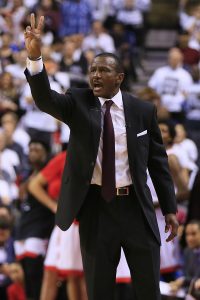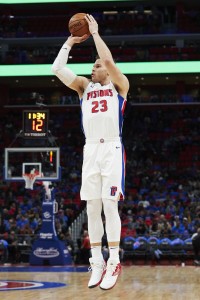After winning 44 games and earning a playoff berth during Stan Van Gundy‘s second year with the franchise in 2015/16, the Pistons regressed over the last couple seasons, playing sub-.500 ball and failing to return to the postseason. Van Gundy took one last big swing prior to the 2018 trade deadline, acquiring Blake Griffin in a mega-deal with the Clippers, but it wasn’t enough to turn Detroit’s season around or to earn Van Gundy another year.
Pistons owner Tom Gores was fully on board with the trade for Griffin, so Van Gundy didn’t lose his job because that move failed to have an immediate impact. It was time for both sides to move on though, and that means the Pistons are in the market for both a head coach and a head of basketball operations, since Van Gundy held both roles.
Here are five key questions facing the franchise this summer:
1. Who will the Pistons hire to coach the team and to run the front office?
The Pistons appear poised to finalize their head coaching search before hiring a new general manager, which sounds backwards. However, it may simply speak to Ed Stefanski‘s importance in the new front office hierarchy. Stefanski’s official title is “special advisor,” and not “president of basketball operations.” But he’ll report directly to Gores and has extensive basketball ops experience. It will be interesting to see how much input he’ll ultimately have in roster decisions once a new GM comes aboard.
That new GM appears likely to be someone who hasn’t held that position for another team. The Pistons are said to be seeking a young, up-and-coming executive who is capable of being the face of the front office for the next decade. As such, the list of names being considered by the club includes several men who were playing in the NBA – or another league – within the five or 10 years. Among them: Nets assistant GM Trajan Langdon, Hawks manager of basketball operations Malik Rose, TNT analyst Brent Barry, and former Pistons players Chauncey Billups and Tayshaun Prince.
Whle the Pistons may hire a relatively inexperienced GM, the current frontrunner for the coaching job has an extensive head coaching résumé — Dwane Casey, recently fired by the Raptors, coached the club for seven seasons and had a huge amount of regular season success. While his struggles in the postseason, particularly against LeBron James-led teams, may be a longer-term concern for Detroit, Casey’s ability to build a culture and develop players would serve the franchise well. Assuming Casey doesn’t want to take a year off from coaching, I’d expect him to be the choice over less experienced options like Spurs assistant Ime Udoka and TNT’s Kenny Smith.
2. Will the Pistons’ new GM follow Van Gundy’s blueprint?
In some cases, a new general manager will have a mandate to rebuild his roster when he lands with a new team, but that seems unlikely to be the case in Detroit, given the veteran-heavy nature of the team’s roster. Before he left the Pistons, Van Gundy was insistent that the club could contend if Griffin, Andre Drummond, and Reggie Jackson stayed healthy. Will the new GM feel the same way?
If so, we’re unlikely to see many major changes made to the Pistons’ roster this summer, which could be a good thing. The Pelicans’ fortunes didn’t turn around immediately after they acquired DeMarcus Cousins in a midseason deal, but a year later, everything came together for the club. There’s no guarantee that the same thing will happen for the Pistons and Griffin, but a full offseason and training camp together should bode well for the 2018/19 season.
I’d expect the Pistons’ new GM to give the current group every opportunity to succeed to start next season, perhaps revisiting that approach by the 2019 trade deadline if necessary.
Read more
3. How can the Pistons add help on the wing?
Of course, the Pistons probably can’t afford to simply run back the exact same roster that missed the playoffs last season. With Jackson, Griffin, and Drummond locked in at the one, four, and five positions, respectively, shooting guard and small forward look like the primary areas for the club to focus on this summer.
Unfortunately, Detroit doesn’t exactly have a ton of cap flexibility to go out and acquire difference-makers at those spots. With eight guaranteed contracts accounting for nearly $112MM on next year’s cap, the Pistons may even be hard-pressed to use the entire mid-level exception before bumping up against the luxury tax line.
Given their spending limitations, the Pistons aren’t likely to land an impact two-way wing in free agency, and their trade assets are limited. Still, veterans like Marco Belinelli, Wayne Ellington, Joe Harris, and Mario Hezonja may be in the team’s price range. Detroit also holds the No. 42 pick in the draft, giving the club a chance to land a potential contributor on the cheap.
4. Will the team explore a rookie scale extension for Stanley Johnson?
The best options for the Pistons at the two and three may already be on the roster, with youngsters Luke Kennard and Johnson perhaps ready to take on larger roles. Johnson, in particular, will be a player worth watching this offseason, since he’ll become extension-eligible for the first time on July 1.
Johnson had a modest bounce-back season in 2017/18 after a poor sophomore showing, but his shooting numbers (.375/.286/.772) still aren’t where they need to be. At just 22 years old, Johnson has plenty of room to grow, but it’s probably too risky for the Pistons to roll the dice on a long-term investment in the former lottery pick at this point in his career.
Detroit is more likely to wait until his restricted free agency in 2019 to make a decision one way or the other on Johnson. So for this summer, the big question will be whether the Pistons block him on the depth chart by acquiring a veteran small forward, or whether they head into the 2018/19 season prepared for Johnson to play significant minutes.
5. Which of the Pistons’ players on non-guaranteed salaries will be back?
Another former first-rounder, Reggie Bullock enjoyed a breakout season for the Pistons in 2017/18, setting new career highs in PPG (11.3), FG% (.489), 3PT% (.445), and many other categories. His play not only makes it an easy decision to guarantee his $2.5MM salary for next season — it should also earn him a key role on the wing next season.
Detroit’s other two decisions on non-guaranteed contracts might not be quite as simple. Eric Moreland, who is owed a non-guaranteed $1.83MM salary for 2018/19, flashed some potential in his limited role, showing an ability to grab rebounds and pass out of the post. However, if Jon Leuer is healthy and Henry Ellenson is ready for a larger role, the team may want a minimum-salary player in Moreland’s spot. Still, I think he’s a good bet to return as frontcourt insurance, given Griffin’s and Leuer’s injury histories.
Dwight Buycks, who has a $1.6MM non-guaranteed salary for 2018/19, was solid in Jackson’s absence last season, but may not be needed next year. Assuming everyone is healthy, Detroit has three players capable of handling the ball in Jackson, Ish Smith, and Langston Galloway. If the Pistons want to add another point guard to the mix, taking a shot on a younger prospect with some upside probably makes more sense.
Here’s where things currently stand for the Pistons financially:
Guaranteed Salary
- Blake Griffin ($32,088,932)
- Andre Drummond ($25,434,263)
- Reggie Jackson ($17,043,478)
- Jon Leuer ($10,002,681)
- Langston Galloway ($7,000,000)
- Ish Smith ($6,000,000)
- Josh Smith ($5,331,729) — Waived via stretch provision
- Stanley Johnson ($3,940,402)
- Luke Kennard ($3,275,280)
- Henry Ellenson ($1,857,480)
- Total: $111,974,245
Player Options
Team Options
Non-Guaranteed Salary
Restricted Free Agents
Unrestricted Free Agents / Other Cap Holds
Projected Salary Cap: $101,000,000
Projected Cap Room: None
- With or without Griffin’s mammoth salary on their cap, the Pistons wouldn’t have had any space this summer, since the contracts for Tobias Harris and Boban Marjanovic run through 2018/19. With Griffin on the books though, Detroit projects to be way over the cap, with a total team salary starting at $114,468,178 — that accounts for the Pistons’ nine guaranteed contracts, plus cap charges for three empty roster spots.
Footnotes:
- Bullock’s salary becomes fully guaranteed after July 15.
- Moreland’s salary becomes guaranteed for $750K after July 8. There are additional partial guarantees of $250K apiece after September 1 and after the first game of the regular season.
- Buycks’ salary becomes fully guaranteed after September 1.
Salary information from Basketball Insiders was used in the creation of this post. Photos courtesy of USA Today Sports Images.

